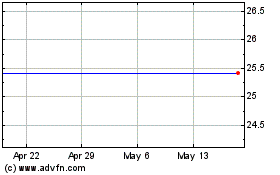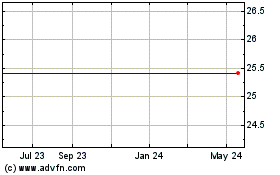Despite LaBranche's Exit, NYSE Sees Life In Specialist Model
15 January 2010 - 7:50AM
Dow Jones News
While the number of specialist operations on the New York Stock
Exchange floor shrank further this week, the business still has
life and could grow in the coming months, according to a top NYSE
Euronext executive.
The anticipated spin-off of some securities overseen by
LaBranche & Co. Inc.'s specialist unit, sold Wednesday to
Barclays Capital, has drawn the attention of market-making firms
not currently active on the floor, according to Joseph Mecane, NYSE
Euronext's head of U.S. cash markets.
Separately, the planned addition of Nasdaq OMX-listed stocks to
NYSE Euronext's Amex platform by March has boosted interest in that
platform's designated market-maker program from automated
market-making firms.
Officials at trading firms Getco and Knight Capital Group (NITE)
confirmed Thursday that they are joining up as designated market
makers at NYSE Amex, and Mecane said he's seeing similar interest
in the NYSE floor from proprietary trading groups.
"The NYSE designated market-maker model is one where a lot of
firms who have established robust trading infrastructures can
leverage that and establish themselves in a new market," Mecane
said.
The exchange operator this week saw the exit of one of the
oldest and biggest specialist units from its historic trading
floor, as the 119-year-old LaBranche sold its operation to Barclays
for $25 million.
That deal lowered the number of specialist firms to four, with
Bank of America Corp. (BAC), Kellogg Group, and Goldman Sachs Group
(GS) unit Spear, Leeds & Kellogg operating alongside Barclays.
A decade ago there were 35 such firms.
Specialist firms, now called designated market makers, use their
own capital to facilitate trading in stocks listed on the exchange,
often by taking the other side of orders from brokers. By standing
ready to buy and sell at all times, they can help keep price
volatility in check, playing a pivotal role on the NYSE trading
floor.
The business was seen coming under siege in 2007, when NYSE
Euronext shifted to a hybrid model of electronic and floor-based
trading. The percentage of NYSE volume executed on the floor has
since slipped to around 17%.
Some specialist operations have cut back on staff, and such
others as Susquehanna International Group LLP of New York and Van
der Moolen Holding N.V. of the Netherlands left the business
altogether.
Robert Pavlik, chief market strategist at Banyan Partners, said
that the specialist business can still be profitable with enough
scale, but acknowledged it isn't what it was. "I don't see anybody
starving on the floor, but there's a lot fewer people on the
floor," he said.
Meanwhile, algorithm-driven electronic trading outfits have
taken center stage as liquidity providers across nearly all listed
U.S. markets, and NYSE Euronext's Mecane said that some are looking
at applying their models to the NYSE floor.
"Being a designated market maker has some additional
responsibilities and components that come along with it, but as the
cost of technology has gone down significantly, the scale becomes a
broader theme as people look to expand their models," Mecane
said.
Meanwhile, the continued concentration of the specialist
business this week has prompted concerns around systemic risk, with
so many securities being handled by an increasingly smaller pool of
big firms.
"Clearly, having too much concentration is something that we
always keep a close eye on, and is part of why Barclays is going to
be selling a portion of the [LaBranche] book," Mecane said. "But
we're not at the point where we have significant concerns about too
much concentration."
-By Jacob Bunge, Dow Jones Newswires; (312) 750 4117;
jacob.bunge@dowjones.com
(Kristina Peterson and Donna Kardos Yesalavich contributed to
this article.)
Nightstar Therapeutics Plc ADS (NASDAQ:NITE)
Historical Stock Chart
From Jun 2024 to Jul 2024

Nightstar Therapeutics Plc ADS (NASDAQ:NITE)
Historical Stock Chart
From Jul 2023 to Jul 2024
